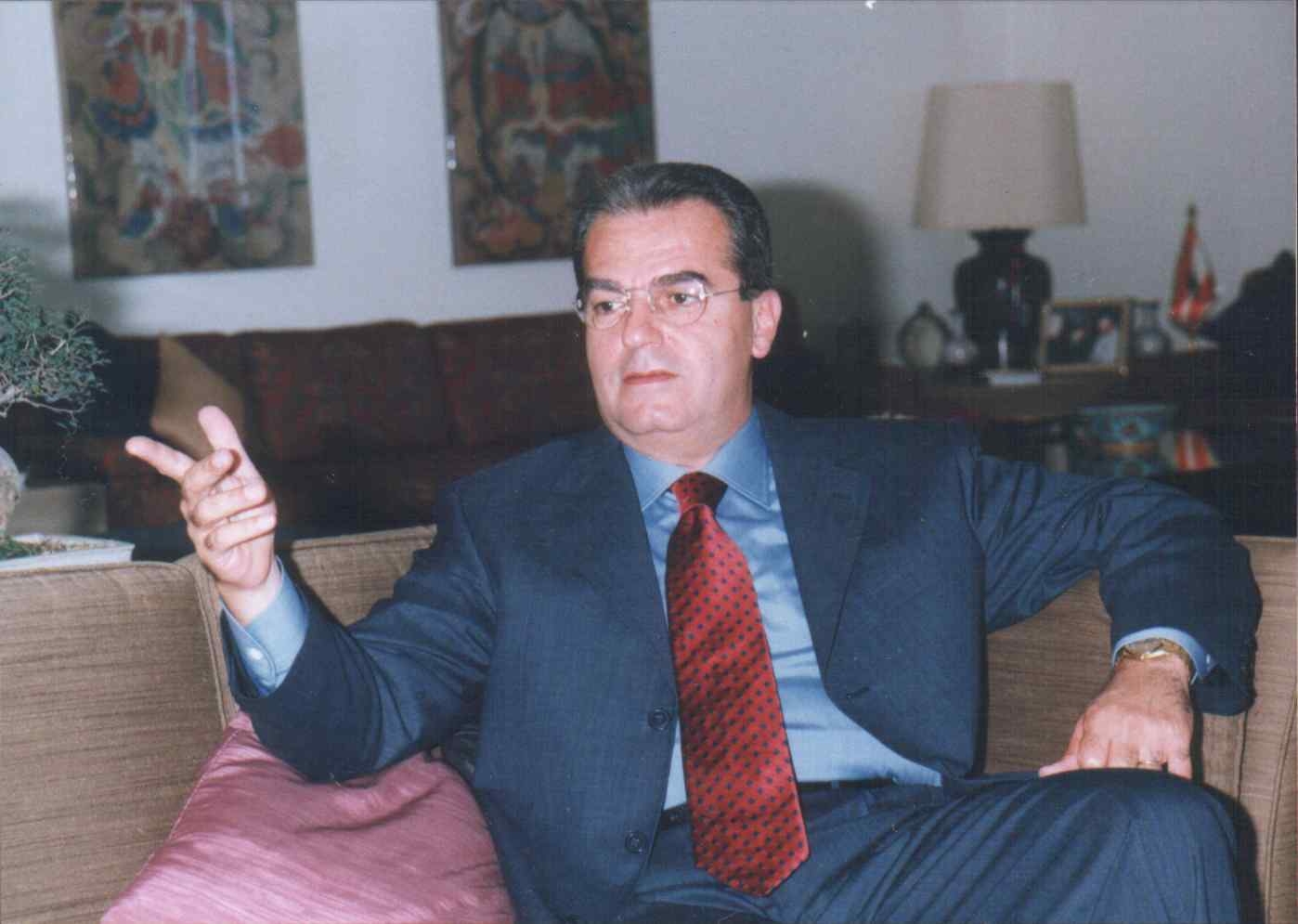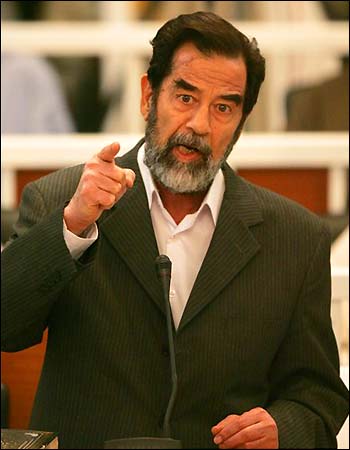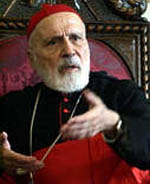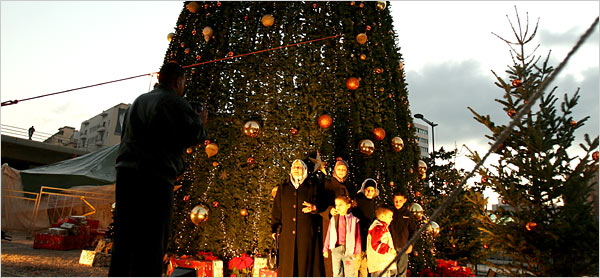إعتبر الوزير السابق وديع الخازن في حديث تلفزيوني اليوم أن الرئيس لحود منفتح على أية مبادرة تؤمن  الإنفراج على صعيد الأزمة الحكومية لأنه حريص على الأمانة التي أولاه إياها الدستور اللبناني وهذه الأمانة تخوله الرجوع إلى الدستور في كلّ خَطوة يخطوها مما يجري فضلاً عن قلقه على الأوضاع الإقتصادية والمعيشية التي تطاول كلّ المواطنين بلا إستثناء.
الإنفراج على صعيد الأزمة الحكومية لأنه حريص على الأمانة التي أولاه إياها الدستور اللبناني وهذه الأمانة تخوله الرجوع إلى الدستور في كلّ خَطوة يخطوها مما يجري فضلاً عن قلقه على الأوضاع الإقتصادية والمعيشية التي تطاول كلّ المواطنين بلا إستثناء.
ولفت أن مبادرة الرئيس الحص لا تبتعد كثيراً عن تفكير رئيس الجمهورية من الناحية الدستورية حيث يُصِرّ على أن المحكمة الدولية هي من شأن رئيس الجمهورية بحسب المادة 52 من الدستور التي تخوله المفاوضة في عقد المعاهدات الدولية وإبرامها بالإتفاق مع رئيس الحكومة. كما أنه يؤكد في مبادرته على صوابية موقف الرئيس لحود من الحكومة اللادستورية واللاشرعية والتي لا يمكنه أن يستجيب لأيّ قرار أو مرسوم يصدر عنها بعد إستقالة وزراء الطائفة الشيعية الكريمة ذات الثقل التمثيلي الشعبي
 BAGHDAD, Dec. 30 (Xinhua) -- Iraq's ousted president Saddam Hussein was defiant and calm, refusing to have a hood pulled over his head while he was led the gallows shortly after 6 a.m. (0300GMT) on Saturday. Iraqi state-run television, al-Iraqia, released videotape of Saddam final moments before execution. The video showed Saddam, wearing a white shirt without a tie and a dark overcoat, being led to the gallows with a calm and defiant face and was chatting with his two masked hangmen who placed the noose around his neck. The Iraqi television later showed footage of Saddam in a white shroud lying with his neck twisted to one side at an awkward angle, with what appeared to be blood or a bruise on his left cheek. Before the rope was put around his neck, Saddam shouted: "God is the greatest. Long live the nation and Palestine is Arab," Sami al-Askari, the political adviser to Prime Minister Nuri al-Maliki, told the Iraqi channel. The execution took place at an Iraqi army base in Kadhimiya, once was Saddam's main military intelligence headquarters.
BAGHDAD, Dec. 30 (Xinhua) -- Iraq's ousted president Saddam Hussein was defiant and calm, refusing to have a hood pulled over his head while he was led the gallows shortly after 6 a.m. (0300GMT) on Saturday. Iraqi state-run television, al-Iraqia, released videotape of Saddam final moments before execution. The video showed Saddam, wearing a white shirt without a tie and a dark overcoat, being led to the gallows with a calm and defiant face and was chatting with his two masked hangmen who placed the noose around his neck. The Iraqi television later showed footage of Saddam in a white shroud lying with his neck twisted to one side at an awkward angle, with what appeared to be blood or a bruise on his left cheek. Before the rope was put around his neck, Saddam shouted: "God is the greatest. Long live the nation and Palestine is Arab," Sami al-Askari, the political adviser to Prime Minister Nuri al-Maliki, told the Iraqi channel. The execution took place at an Iraqi army base in Kadhimiya, once was Saddam's main military intelligence headquarters.
Vatican City, Vatican (AHN) - The Vatican on Saturday strongly condemned the execution of ousted Iraqi President Saddam Hussein and termed it 'tragic'.In a statement issued by the Vatican press office, a Vatican official said: "An execution is always tragic news, reason for sadness, even in the case of a person who is guilty of grave crimes."Saying that the execution could trigger a wave of revenge, the official said, "There is a risk of setting off a wave of revenge and sowing new seeds of violence." The killing of the guilty was not the way to re-establish justice and reunite society, the spokesman said.
"Protests sometimes turn into mayhem, which we do not want," he added. The prelate said he hoped "Lebanon recovers its prosperity, security and peace." The prelate also met with Reform and Change bloc MP Ibrahim Kenaan, who discussed with him the latest developments in the country. "The current crisis needs a solution rather than political disputes," Kenaan said. "The opposition, our parliamentary bloc and the Free Patriotic Movement (FPM) stress the need to promote partnership and balance in the country through a true participation in authority," he added. The FPM member said that "this will be the starting point to a solution [to the current political deadlock]." Praising the "declaration of principles" issued by the Council of Maronite Bishops earlier in the month, Kenaan said that "we should shift from an oral support for the declaration to a practical one." "All the Lebanese, especially the Christians, should put that declaration into effect," he said. Headed by Sfeir, the council issued a conciliatory statement earlier in December in which it provided for the divided Lebanese groups to follow to end the political crisis. By Maroun Khoury, Daily Star, BKIRKI: Maronite Patriarch Nasrallah Butros Sfeir said Thursday that the protests currently taking place in Lebanon can very easily engender chaos. Speaking during a meeting with a delegation of residents from the Bekaa regions of Baalbek and Deir al-Ahmar, Sfeir said that "protests like these are unfortunately allowed in Lebanon and if we look around us, we can see none of the countries allow their citizens to do what the Lebanese are doing these days."
By Maroun Khoury, Daily Star, BKIRKI: Maronite Patriarch Nasrallah Butros Sfeir said Thursday that the protests currently taking place in Lebanon can very easily engender chaos. Speaking during a meeting with a delegation of residents from the Bekaa regions of Baalbek and Deir al-Ahmar, Sfeir said that "protests like these are unfortunately allowed in Lebanon and if we look around us, we can see none of the countries allow their citizens to do what the Lebanese are doing these days."
 The New York Times, By HASSAN M. FATTAH, BEIRUT, Lebanon, Dec. 28
The New York Times, By HASSAN M. FATTAH, BEIRUT, Lebanon, Dec. 28
Khazen History


Historical Feature:
Churches and Monasteries of the Khazen family

St. Anthony of Padua Church in Ballouneh
Mar Abda Church in Bakaatit Kanaan
Saint Michael Church in Bkaatouta
Saint Therese Church in Qolayaat
Saint Simeon Stylites (مار سمعان العامودي) Church In Ajaltoun
Virgin Mary Church (سيدة المعونات) in Sheilé
Assumption of Mary Church in Ballouneh
1 - The sword of the Maronite Prince
2 - LES KHAZEN CONSULS DE FRANCE
3 - LES MARONITES & LES KHAZEN
4 - LES MAAN & LES KHAZEN
5 - ORIGINE DE LA FAMILLE
Population Movements to Keserwan - The Khazens and The Maans
ما جاء عن الثورة في المقاطعة الكسروانية
ثورة أهالي كسروان على المشايخ الخوازنة وأسبابها
Origins of the "Prince of Maronite" Title
Growing diversity: the Khazin sheiks and the clergy in the first decades of the 18th century
Historical Members:
Barbar Beik El Khazen [English]
Patriach Toubia Kaiss El Khazen(Biography & Life Part1 Part2) (Arabic)
Patriach Youssef Dargham El Khazen (Cont'd)
Cheikh Bishara Jafal El Khazen
Patriarch Youssef Raji El Khazen
The Martyrs Cheikh Philippe & Cheikh Farid El Khazen
Cheikh Nawfal El Khazen (Consul De France)
Cheikh Hossun El Khazen (Consul De France)
Cheikh Abou-Nawfal El Khazen (Consul De France)
Cheikh Francis Abee Nader & his son Yousef
Cheikh Abou-Kanso El Khazen (Consul De France)
Cheikh Abou Nader El Khazen
Cheikh Chafic El Khazen
Cheikh Keserwan El Khazen
Cheikh Serhal El Khazen [English]
Cheikh Rafiq El Khazen [English]
Cheikh Hanna El Khazen
Cheikha Arzi El Khazen
Marie El Khazen